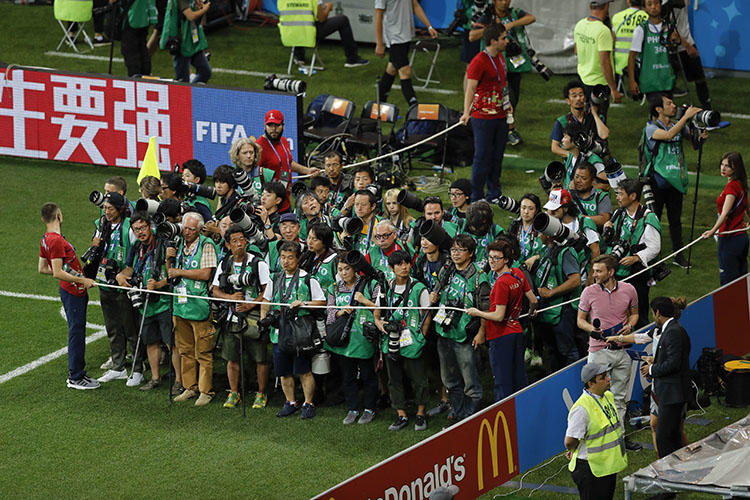With the World Cup final just a few days away, female sports journalists say the experiences of at least four reporters who were grabbed, groped, or sexually harassed on air while covering the tournament in Russia have highlighted the harassment they face.
The #MeToo movement has allowed many journalists to speak publicly about work-related discrimination and harassment, and campaigns such as Brazil’s #deixaelatrabalhar or “Let her do her job,” have offered awareness and support. Three U.S. journalists who spoke with CPJ said the public harassment of Deutsche Welle’s Julieth Theran Gonzalez, TV Globo and Sport TV’s Júlia Guimarães, Mediaset’s Maria Gomez, and Univision’s Ahtziri Cárdenas at the World Cup is emblematic of what they have to deal with.
Liz Martin, senior visual journalist at The Gazette in Cedar Rapids, Iowa, said that harassment and sexism has gotten in the way of her work, particularly when covering crime stories, and that incidents occur a few times a month. While she has become quicker at recognizing problematic behavior, Martin said it was “tiring to exert mental energy on monitoring interactions that might cross the line or be perceived as encouraging inappropriate contact.”
“I would describe it as the sort of run-of-the-mill harassment that so many women face, but with the added complication that I’m working and need to maintain professional demeanor,” Martin said.
Martin said she uses tactics such as redirecting a conversation, or finding a reason to move locations. Bringing her camera back up to her eye is a nonverbal signal that she’s there to work, and she has an arsenal of stock responses when men comment on the size of her camera.
“Comments about camera size are common among all photographers regardless of gender, but I notice a sexual undertone that my male colleagues have said they don’t experience,” she said. “Stock responses like ‘Yep, it gets the job done,’ or ‘Yes, carrying this weight all day means I have to be pretty strong’ generally work well for me.”
When TV Globo and Sport TV’s Guimarães was harassed during a World Cup broadcast, she was more direct. Video shows the reporter telling a man who tried to kiss her, “Never do this to a woman, OK? Respect.”
Freelance photographer Katharine, who asked to be identified only by her first name to avoid professional repercussions, told CPJ that when she was photographing a soccer game in California in April she felt someone grab the back of her head. Katharine said she remembers looking down the field, her eye to the camera. Her back was to the fans, who were close enough to touch her hair.
“I felt something grab my hair. I thought it was a drunk fan who thought it would be funny, which in my mind is more forgivable than what happened,” Katharine said, adding that when she looked around she saw a team mascot.
She said the mascot did a little dance, as if to indicate “this is so playful and fun.” But, Katharine said, the incident was “a very hands-on example of what we deal with all the time.”
Kimberly Wethal, a 22-year-old community reporter and photojournalist at the Unified Newspaper Group in southern Wisconsin, said she was harassed over the way she was dressed while reporting on a college football game in November 2014. Wethal, who at the time was wearing her daily uniform–skinny jeans and TOMS shoes–said a referee told her that if she was his daughter, he would have “slapped her back inside” for her outfit choice.
“Once I processed what he had said, I felt insulted, uncomfortable and tried to avoid him for the remainder of the game,” said Wethal. “There was a younger referee who was standing next to him that heard the interaction, but said nothing.”
Wethal said she discussed the incident with her sports editor, a woman and student adviser, and the assistant sports editor, a man. She said she believes the sports editor spoke with the school’s athletic department to make them aware of the issue. “It was a great sense of solidarity,” she said.
“I don’t think it’s on just women to do the educating,” Wethal added. “Men need to play a role in this by standing up for their female peers. Companies need to hire more female sports reporters to allow audiences to get used to seeing women as a valid source of sports information.”
She added that while she had moments of feeling uncomfortable after the incident, it was nothing severe enough for her to consider asking for a different assignment.
All three journalists said that the support of a female mentor or colleague, or social media spaces, was valuable. The photographer, Katharine, added the #MeToo movement has made her more likely to report future harassment.
Martin said she has found online support groups a good space to talk about harassment with other journalists. It’s been helpful to get “validation that this is harassment and that we are allowed to be annoyed or upset,” she said.
Wethal said, “I don’t know if it’s necessarily been my role as a reporter that has prompted more sexual harassment, but I think the nature of the job that keeps me highly visible to people contributes more to harassment than the role itself.”
She added, “I think a combination of being a female, a reporter, being a sports photojournalist while identifying as female, and even attitudes toward the press all can lend to being reasons someone uses to engage in harassing behaviors, especially sexual harassment.”
Martin added, “Simply having cameras on my shoulders gives people a reason to approach.”
